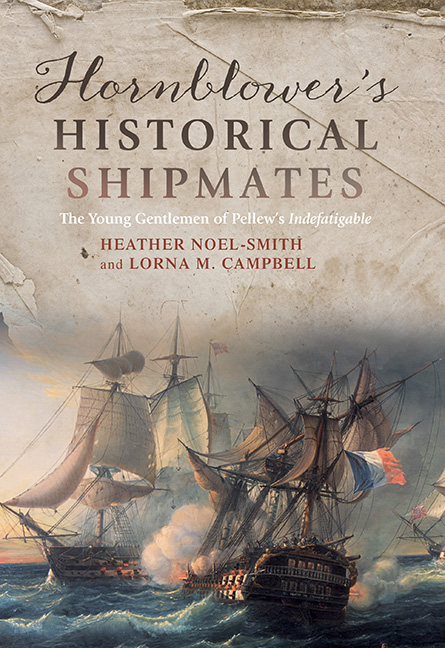Book contents
- Frontmatter
- Dedication
- Contents
- List of Illustrations
- Preface and Acknowledgements
- List of Abbreviations
- Introduction
- 1 Edward Pellew – Partisan and Patriarch
- 2 ‘My Dear Indefatigable’
- 3 The Fortunate Few
- 4 ‘Never Was Such an Action Known’
- 5 The Nature of Patronage
- 6 ‘Boys Grown to Manhood’
- 7 Diversity and Responsibility
- 8 Friends, Family and the Falmouth Connection
- 9 ‘Faithful and Attached Companions’
- 10 ‘No State in Life More Honourable’
- Appendix The Spencer–Pellew Correspondence of February 1799
- Bibliography
- Index
3 - The Fortunate Few
Published online by Cambridge University Press: 28 April 2017
- Frontmatter
- Dedication
- Contents
- List of Illustrations
- Preface and Acknowledgements
- List of Abbreviations
- Introduction
- 1 Edward Pellew – Partisan and Patriarch
- 2 ‘My Dear Indefatigable’
- 3 The Fortunate Few
- 4 ‘Never Was Such an Action Known’
- 5 The Nature of Patronage
- 6 ‘Boys Grown to Manhood’
- 7 Diversity and Responsibility
- 8 Friends, Family and the Falmouth Connection
- 9 ‘Faithful and Attached Companions’
- 10 ‘No State in Life More Honourable’
- Appendix The Spencer–Pellew Correspondence of February 1799
- Bibliography
- Index
Summary
A wide range of original source materials have been used to identify the young gentlemen present aboard His Majesty's Ship Indefatigable on the night of the Droits de L'Homme engagement and to trace their naval careers, civilian lives and ongoing personal relationships. These sources include the Indefatigable's muster and pay books, which have been cross-referenced with captains’ and masters’ logs. Musters and pay books generally contain much the same information, but on occasion one will record a detail that is missing from the other, while captains’ and masters’ logs can be used to broaden the picture. For example, entries in the muster which record that crew members despatched in a prize ship have been captured, can be cross-referenced with logs of the appropriate date to reveal the name and provenance of the prize. Lieutenants’ passing certificates also provide a useful overview of young officers’ early careers; however, these particular documents should be treated with caution as some of the data they contain, particularly age and years of service, often appears to have been falsified. Additional invaluable source materials include Admiralty service records, personal correspondence from serving officers and published service biographies such as Marshall's Naval Biography.
Where available, non-naval sources have also been used to provide an accurate picture of the lives of the Indefatigable's young gentlemen outwith the service. These can be broadly divided into two categories: genealogical sources, including birth, marriage and death records, wills, tax records and property deeds; and publications and manuscripts, including articles from local and national newspapers and contemporary journals and manuscript letters from a variety of public archives and private collections.
The primary source used to identify this distinct cohort of young gentlemen is the Indefatigable's muster book for January–February 1797. Ships’ musters normally cover two-month periods, with occasional variations, for instance when a ship is paid off. Although the information contained in the double-page entries of muster books appears sparse on first sight, these bald facts provide a solid basis for investigating the lives and careers of individual officers and men. Most of the relevant details appear on the verso page of the muster in columns recording date of first joining, age on joining ship, birthplace, name, rating and discharge. The columns of the recto page, which concern payments for tobacco, clothing etc., are less likely to be filled in consistently.
- Type
- Chapter
- Information
- Hornblower's Historical ShipmatesThe Young Gentlemen of Pellew's <I>Indefatigable</I>, pp. 46 - 59Publisher: Boydell & BrewerPrint publication year: 2016

